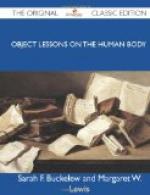What other poison hurts the bones?—“Tobacco.”
How do alcohol and tobacco hurt the bones?—“They make bad blood, and bad blood makes poor bones.”
* * * * *
[Illustration: FRONT VIEW OF THE MUSCLES OF THE BODY.]
* * * * *
PART VI.
FORMULA FOR THE LESSON ON THE MUSCLES.
1. Muscles are the red, elastic bands and bundles of thread like substance, called flesh, which cover the bones and make the eyeballs, the eyelids, the tongue, the heart, the lungs, and various other parts of the body.
2. There are about four hundred and fifty muscles in my body.
3. The work of the muscles is to support and move my bones, and different parts of the body.
4. The muscles may be named the muscles of my head, the muscles of my trunk, the muscles of my limbs.
5. The muscles of my head cover and move the parts of my head and face. The muscles of my trunk cover and move the parts of my neck and trunk. The muscles of my limbs cover and mote the parts of my arms and legs.
6. Those muscles are the weakest which I use least; those muscles are the strongest which I exercise most in work or play.
7. If I would be strong and healthy,
my muscles must be used,
my muscles must be rested,
my muscles must be supplied
with good blood.
I must exercise in work and play to make them strong; I must sleep, or change my kind of work or play, to give them rest, when they are tired; I must breathe pure air, take wholesome food and drink, and live in the sunlight, to supply them with good blood; I must not weaken them by using alcohol or tobacco.
* * * * *
QUESTIONS FOR THE FORMULA.
1. Tell about the muscles.
2. How many muscles have you in your body?
3. Of what use are the muscles?
4. How may the muscles be named?
5. Tell about the muscles of the head, trunk, and limbs.
6. Which muscles are the weakest, and which are the strongest?
7. What is necessary if you would have strong and healthy muscles?
* * * * *
CLASSES AND WORK OF THE MUSCLES.
The muscles are divided into two great classes: those which we may move as we choose, called voluntary muscles, and those over which we have no power, called involuntary muscles.
Some muscles support and move the various parts of the body, others have different work to do. The heart, the great involuntary muscle, acts like an engine to drive the blood throughout the body; the lungs draw in and throw out the air in breathing; the stomach helps to churn and change food into blood; the tongue is used in speaking and eating.
* * * * *




